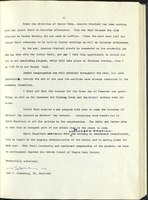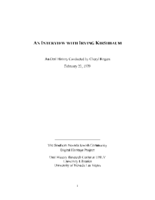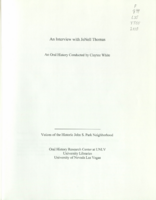Search the Special Collections and Archives Portal
Search Results

Minutes from Temple Beth Sholom Board of Directors meetings, May 1974 - May 1975
Date
Archival Collection
Description
The meeting minutes of the board of directors of Temple Beth Sholom include the proceedings of meetings held from 1973 to 1974.
Text

Interview with Dorothy Jean (Whitcomb) Grier, January 3, 2005
Date
Archival Collection
Description
Access note: No audio available
Text
Culinary Workers Union Local 226 Las Vegas, Nevada Photographs
Identifier
Abstract
The Culinary Workers Union Local 226 Las Vegas, Nevada Photographs document various activities of the Culinary Union, from the 1950s to 2006, with the bulk of the material documenting the 1990s. Prominently featured in the collection are various strikes, pickets, marches, parades, rallies, and demonstrations from the late 1980s to early 2000s. A large portion of these photographs documents the Frontier Strike of the 1990s. Also included are photographs of press conferences, political rallies, internal committee meetings, Hotel Employees and Restaurant Employees (H.E.R.E.) conventions, and various social events. Materials contain photographic prints, photographic negatives, and a small number of slides.
Archival Collection

Transcript of interview with Sari and Paul Aizley by Claytee D. White, November 4, 2016
Date
Archival Collection
Description
As Sari and Paul Aizley recall their separate childhoods and journeys to Las Vegas, their work and volunteer histories, their efforts to build a better society, and their life together they speak to each other as much as they respond to questions about their observations on the growth of the Las Vegas urban environment and their contributions to Southern Nevada's cultural development and a just society. In this interview, Sari and Paul speak to the cross-town commute and the physical UNLV campus in the late 1960s; the growth of the UNLV Math Department; the evolution of UNLV's Continuing Education; the State's North-South funding rivalry as reflected in the built environments of University of Nevada in Las Vegas and in Reno; plans to build a paleontology research facility at Tule Springs National Monument; the Review-Journal's "Ask Jessie Emmet" Real Estate column; local ACLU offices and politics; Fair Housing; transgendered persons; the Nevada State Assembly, and Class! magazine for Clark County high school students. Sari and Paul smile at each other as they recall how the editor/publisher met the bearded math professor and fell in love—despite the fact that they tell slightly different versions of their initial meeting(s). Sari passed away November 1, 2017, three days shy of one year after she participated in this interview.
Text

Patricia Vazquez interview, November 14, 2018, June 14, 2019: transcript
Date
Archival Collection
Description
Session 1: Interviewed by Marcela Rodriguez-Campo. Barbara Tabach also participates in the questioning. Session 2: Interviewed by Rodrigo Vazquez. Monserrath Hernandez also participates in the questioning. Patricia Vazquez was born and raised in Las Vegas, NV and shares her experiences growing up in the Valley as a Queer Latina. At a young age, she remembers traveling back and forth between Mexico and the U.S. to visit family. When she started school she shares how her home language, Spanish, became her family's "secret language" as she began to learn English. During elementary school Patricia was tracked into the special education program, and remove from the mainstream classroom. She would find her love for learning in books and libraries as she taught herself how to read in English. Despite being tracked into less advanced courses, Patricia would end up taking AP/ Honors courses in high school after forging her favorite teachers signature, which changed her educational trajectory. After coming out to her family, Patricia went nearly a decade distanced from her mother and continued her college education at Arizona State University. There, she would complete a bachelors in painting and a masters in comparative literature. Her work with the Chicano Studies program at ASU helped her develop her Chicana identity and begin her involvement in social activism. In Las Vegas, she worked to fight for marriage equality and LGBTQ rights with the American Civil Liberties Union , and later with the Progressive Leadership Alliance of Nevada. She also conducted several lectures for the Latino Youth Leadership Conference on sexuality, gender, and homophobia for over a decade. She has served as an English Professor at the College of Southern Nevada for the last 20 years and is an avid hiker, traveler, and painter.
Text

Transcript of interview with Yorgo Kagafas by Claytee White, January 14, 2010
Date
Archival Collection
Description
Yorgo Kagafas is a self-described "urban guy." He became an Urban Planner for the City of Las Vegas in 1999. A farm boy from Ohio, he was educated at The Ohio State University, served in the US Navy and earned a M.A. in Environmental Planning from Arizona State University. He came to Las Vegas with a successful grassroots experience from living in a historic Phoenix neighborhood. His unique background complemented his new job which was to implement the Neighborhood Planning Process, a proactive system for Las Vegas communities to express their neighborhood desires prior to a developer coming in with their own agenda. In this interview he explains the criteria that must be met in this process. By coincidence, Yorgo moved into the John S. Park Neighborhood. He was attracted to its central location, intact residential neighborhood, and homes with character at affordable prices. While walking his dog one day, he met neighborhood leader, Bob Bellis, and became aware of neighborhood activism that could use his expertise. Yorgo points out that the good-old-boy mentality that still existed in Las Vegas was a potential obstacle. However he, Bob, and others were able to rally the homeowners and became a textbook example of how the Neighborhood Planning Process should work. He helped them identify their main issues: 1) Mary Dutton Park rehabilitation; 2) code enforcement of property maintenance; 3) attaining historic designation; 4) halting commercial encroachment. That was the first battle, according to Yorgo. With that done, they could next devise and implement a plan, which he describes. The process officially began March 14 2000. In June 2001, the Las Vegas City Council approved the final document.
Text

Transcript of interview with Thelma Coblentz by Judith Chavez, February 17, 1980
Date
Archival Collection
Description
On February 17, 1980, Judith Chavez interviewed Thelma Coblentz (born 1911 in New Jersey) about her experiences in Southern Nevada. Coblentz first talks about her move to Lovelock, Nevada, where her husband provided medical care as one of the first physicians in the small town. She later talks about her move to Las Vegas and some of the services she helped to provide at Nellis Air Force Base. Coblentz later describes Downtown Las Vegas, specifically the development of the casinos and shopping businesses. She later talks about the rainstorms and dust storms that the city would experience before recalling some of the entertainers who would perform on the Las Vegas Strip. The interview concludes with a discussion on the first physicians in Las Vegas and the increasing population of the city.
Text

Transcript of interview with Charlotte Hill by Clattee D. White, May 4, 2009
Date
Archival Collection
Description
Charlotte Hill's arrival in Las Vegas was not an instant love affair. She had grown up in Cincinnati, Ohio, and in comparison Las Vegas "was the worst place I had ever been." The year was 1952. He husband had taken a job with the Sands casino. Over the next six decades Charlotte would become an honored volunteer and community activist. Her first organization was the Brownies as a mother and soon was involved with the Frontier Girl Scout Council, about which she shares a delightful story about cookie sales. In 1962, she was a charter member of the Home of the Good Shepherd. In 1972, she founded the Friends of Channel 10 and became innovative and active in fundraising for public broadcasting. By 1974, she was the United Way's first woman campaign chairperson, a quite successful one who helped exceed the one-million dollar goal during economically difficult times. Her other milestones included serving on Economic Opportunity Board, board of Boys and Girls Clubs of Las Vegas, as president of the Community College of southern Nevada Foundation and most recently being named to the Nevada State Board of Education. Charlotte's community efforts have made a difference in countless people's lives. She has been acknowledged numerous times, but counts the Alexis de Tocqueville Award from United Way of America as a crowning achievement. In addition to her volunteer work, she is a fashion consultant with the Carlisle Collection.
Text

Transcript of interview with Irving Kirshbaum by Cheryl Rogers, February 23, 1979
Date
Archival Collection
Description
Interview with Irving Kirshbaum by Cheryl Rogers on February 23, 1979. In this interview, Kirshbaum discusses the Riviera Hotel where he began working in 1955. He also talks about the landscape of the Las Vegas Strip in the 1950s, and the state of gambling, comps, customer service, and dealer training. The interviewer asks about the treatment of minorities at the Riviera, and in Las Vegas generally, and the effect of corporate ownership on casinos.
Text

Transcript of interview with JoNell Thomas by Claytee White, January 12, 2010
Date
Archival Collection
Description
JoNell Thomas grew up in a large Utah family, went to Utah State and law school at University of Utah. She moved to Nevada in 1992; first as with the Nevada Supreme Court and then as a staff attorney with a Las Vegas firm, and currently is an attorney with the Clark County Special Public Defender's office. She and her husband, Billy Logan and their twin daughters have lived in the John S. Park Neighborhood since 2001. Their residence was constructed in 1956 on a large corner lot with lots of trees and a fifty-year-old swimming pool. JoNell offers her observations on a variety of JSP events: Stratosphere's failed rollercoaster across the Strip idea; the proposed high-rise complexes; the Monorail lack of convenience to locals; effects of dropping home prices and downturn of economy; the homeless population and closing of Circle Park. She helped create the early online community called the Downtown Neighbors website which provided information regarding , part activist, part pra
Text
